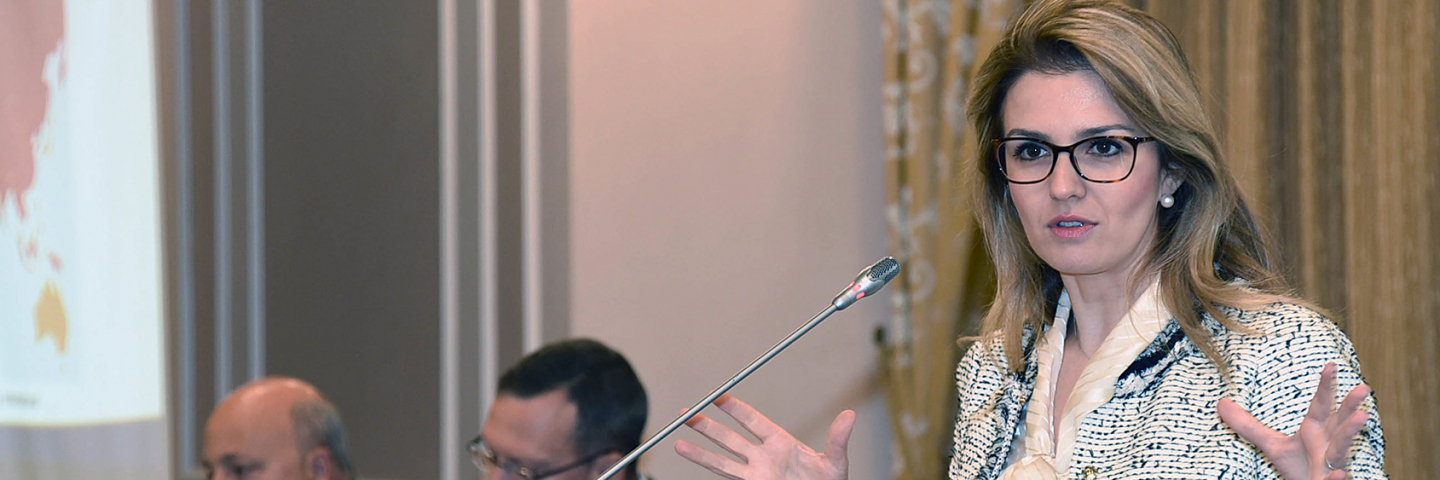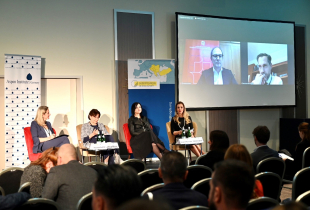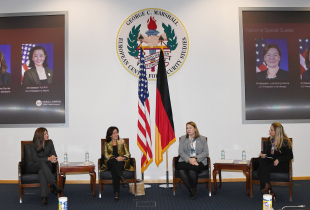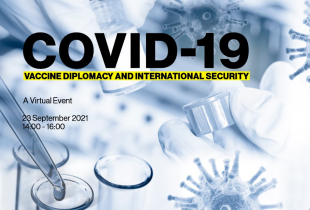
Marshall Center’s Seminar Encourages First Line of Defense in the Fight Against Corruption
By Christine June
Public Affairs Office
George C. Marshall European Center for Security Studies
KYIV (April 17, 2017)—Nane Harutyunyan, a lawyer with the Ministry of Justice in Armenia, wrote notes, asked questions and researched in the evenings because she knew the “Black Sea-Eurasia Region Countering Corruption Seminar” she was attending here was “very important” for her country.
“Where I work, we are in charge of developing anti-corruption policies in Armenia,” said Harutyunyan, who has worked at the Armenian Ministry of Justice for about two years. “It’s a new culture of fighting corruption in Armenia.”
She added that “this intensive fight” against corruption in Armenia started about five years ago.
“That’s why seminars and conferences, and interaction with anti-corruption experts is very important for us because we do not have many experts or scholars in this field in my country,” she said.
Impact of Corruption on National Security
This anti-corruption seminar was held April 11 and 12. It was hosted by the Black Sea and Eurasia Program of the George C. Marshall European Center for Security Studies, a German-American partnership and Defense Regional Security Center, based in Garmisch-Partenkirchen, Germany.
“The main focus of this seminar was to examine how corruption impacts the economies of countries in the Black Sea and Eurasia region,” said Professor Joe Vann, course director of the Marshall Center’s Program on Countering Transnational Organized Crime (CTOC). “Corruption impacts state security in a significant manner and has a direct impact on national security in the region.”
The Marshall Center organizes about 10 events a year in the Black Sea and Eurasia region. This seminar was the first one focused exclusively on countering corruption, but this is an issue that comes out in every event hosted by the Marshall Center in this region, said Dr. Valbona Zeneli, director of the Marshall Center’s Black Sea and Eurasia Program.
“Corruption is being seen as a first tier national security threat that affects the everyday lives of average people,” Zeneli said.
Historically, defense security issues have been associated with military matters, but the Marshall Center began looking at the impact of corruption on national security in 2011, said Vann, who was the academic lead for this seminar.
“We are seeing is that corruption now represents a clear threat in many partner countries,” he said.
Andrill Marusov, from Transparency International Ukraine, was a panel member on the discussion of the contributions of civil society in countering corruption during the seminar.
“I am 200 percent persuaded that in the case of Ukraine, it was the corruption that was the main leading cause and reason for the Annexation of Crimea and fueled the war in the East because the ruling elite (in Ukraine) was so deeply corrupted,” he said.
‘A Battle None of Us Can Afford to Lose’
Zeneli said that goals for this seminar was to show that corruption impacts all sectors of a country and the importance of whole-of-government and civil society approaches in fighting corruption. The seminar also examined the economic reasons for prioritizing the fight against corruption and offered opportunities to collaborate with regional anti-corruption agencies.
More than 30 people from six countries in the region attended the seminar. They represented their countries’ ministries of foreign affairs, defense, justice, economy and internal affairs, as well as government and civilian anti-corruption agencies.
Harutyunyan and her fellow participants were carefully selected because they represent the face of new leadership and the evolving cadre of professionals who are managing the front line fight against corruption in our partner countries, said Vann.
“They are the first line of defense for improving the stature of their countries as far as waging the fight against corruption,” he said.
George Kent, deputy chief of mission with the U.S. Embassy in Ukraine, talked about the importance of countering corruption in the region during his opening remarks.
“We all understand that unless corruption is addressed head on, with new institutions and enduring political will, no transformation of the region and your individual countries can take place,” he said. “The struggle against corruption and to create more prosperous, secure and just countries is a battle that none of us can afford to lose.”
Strength of the Marshall Center
Other seminar speakers represented the German Embassy in Ukraine, United Nations Development Program (UNDP), U.S. Agency for International Development (USAID), the newly-established National Anti-Corruption Bureau of Ukraine (NABU), former chief of the National Police of Ukraine, Marshall Center faculty and academic intuitions such as Harvard Kennedy School in Cambridge, Mass., and Northwestern University in Evanston, Ill.
“Bringing together subject matter experts, international government practitioners and policy-makers to focus on topics of national or regional security relevance is a strong suit of the Marshall Center,” said Ralph R. “Rick” Steinke, associate dean of the College of International Security Studies at the Marshall Center. “Our charter includes building capacity and networks for enhancing international security cooperation.”
Zeneli agreed that this seminar provided a venue for networking and sharing ideas and best practices among participants, speakers and Marshall Center faculty.
“We are here to listen to the main challenges that our participants raise as concerns, and we try to include that in our future programs,” she said.
A variety of topics were discussed during panel sessions highlighting how corruption causes a negative impact on countries’ national security and regional stability, economic prosperity, transparent governance and rule of law.
‘Soft Power’ Makes a Difference
For Harutyunyan, many of these topics were new such as having a separate anti-corruption court instead of relying on criminal courts, but it was learning about international corruption from a participant’s question that had her planning a discussion with her colleagues when she got back home.
“We drafted a legal package to establish an anti-corruption government commission that is independent and strong to effectively prevent corruption among our politicians and high-ranking officials,” she explained. “We worked on a declaration and verification system for these officials to declare their assets to this commission. This is very important for us. We worked very careful on this law.
“But, it only deals with national assets. We did not think of an international system for verification of assets overseas,” she said. “I need to raise this issue with my colleagues.”


